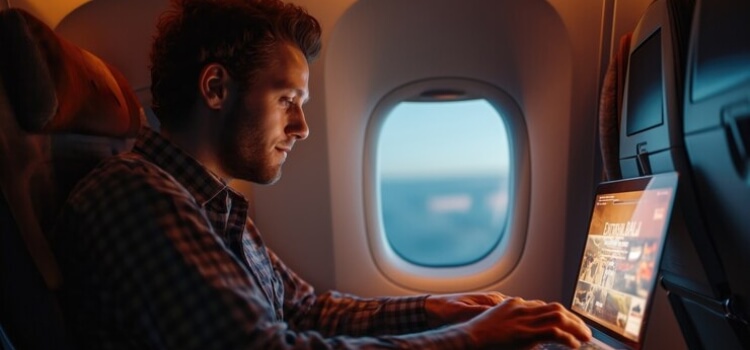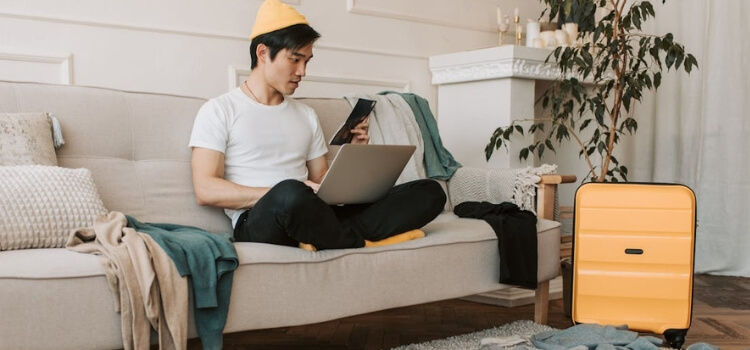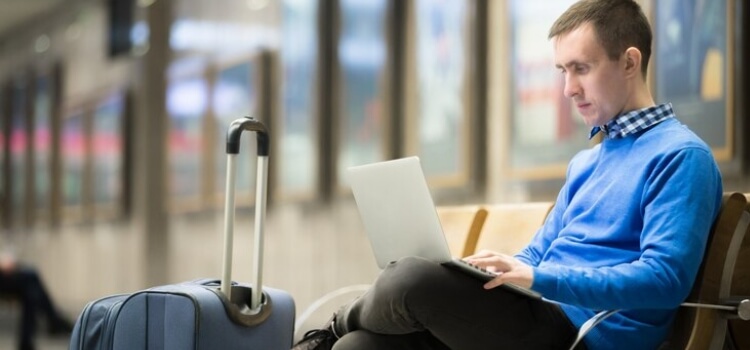As an Amazon Associate, I earn from qualifying purchases
You can bring multiple laptops on a plane, but limitations may vary, so check with the airline. Travelers often wonder about the number of laptops they are allowed to bring on board a plane.
Planning and understanding the regulations can prevent any last-minute stress or confusion. It’s essential to verify the specific guidelines set by the airline you are flying with, as policies can differ between carriers. Generally, one or two laptops for personal use are permitted, but additional laptops may need to be stored in checked baggage.

To ensure a smooth travel experience, pack and organize your electronic devices accordingly to comply with airline regulations and security checkpoints. Following these rules helps you confidently bring your laptops on board without any issues.
Know The Airline Regulations
Before packing your laptops for a flight, it’s crucial to check the specific regulations set by the airline you are traveling with.
Understand Carry-on And Checked Baggage Limits
Airlines have specific rules regarding the number of laptops you can carry both in your carry-on and checked baggage.
Consider Tsa Guidelines
When it comes to traveling with laptops, it’s essential to be informed of the Transportation Security Administration’s (TSA) requirements. These guidelines outline the rules and restrictions regarding laptops and other electronic devices that can be carried onto a plane. By familiarizing yourself with the TSA guidelines, you can ensure that your airport experience is pleasant and hassle-free.
Review Transportation Security Administration Rules
Here are some critical TSA guidelines to keep in mind:
- Remove your laptop from its bag: During the time that you are at the Transportation Security Administration (TSA) security checkpoint, you will be forced to take your laptop from its luggage and place it in a separate bin so that it can be screened. This applies to both carry-on bags and personal items. This allows the TSA officers to get a clear view of the laptop, ensuring efficient and effective security screening.
- Ensure the laptop is easily accessible: It’s essential to have your laptop easily accessible when going through security. Consider storing it in an easily accessible pocket for quick and efficient retrieval during the screening procedure.
- Be aware of liquid restrictions: While the focus here is on laptops, it’s worth mentioning that liquids are subject to restrictions as well. Remember that any liquids, including those in your laptop bag (such as water bottles or liquids in travel-sized containers), must adhere to the TSA’s 3-1-1 rule. That means liquids should be in containers of 3.4 ounces (100 milliliters) or less, stored in a clear, quart-sized bag, and only one bag per passenger.
Lithium Batteries Restrictions
It’s also crucial to take note of the TSA’s restrictions on lithium batteries:
- Carry spare batteries in carry-on luggage: The TSA recommends carrying spare lithium batteries in carry-on luggage rather than in checked baggage. Lithium batteries are more likely to start a fire when they come into contact with certain materials.
- Follow battery size limits: If you’re carrying spare lithium batteries, remember that they must adhere to size limits set by the airline. Batteries exceeding the recommended size may not be allowed on the plane.
- Protect the battery terminals: When packing spare lithium batteries, ensure that the terminals are protected from short circuits. You can use battery covers or place them in individual plastic bags to prevent any contact between the terminals and other metal objects like coins or keys.
By considering the TSA guidelines and understanding the restrictions on laptops and lithium batteries, you can have a stress-free experience when traveling with your devices.
International Travel Considerations:
Research Foreign Country Regulations
Each country has different policies for bringing laptops on flights.
- Check with the airline and the specific country’s regulations.
- Research online or contact the embassy for up-to-date information.

Voltage And Plug Type Compatibility
Ensure your laptop charger is compatible with the destination country’s voltage.
| Country | Voltage | Plug Type |
| United States | 120V | Type A/B |
| United Kingdom | 230V | Type G |
Tips For Packing Laptops
When it comes to traveling with laptops, proper packing is essential to ensure their safety and ease of screening at airport security. By following a few simple tips, you can protect your valuable devices and ensure a hassle-free experience when going through the screening process. To help you out, here are some valuable recommendations for packing laptops:

Use Protective Cases
Purchasing a high-quality laptop case or sleeve is essential if you want to protect your computer from any potential damage that may occur while it is being transported. A padded case provides an extra layer of protection against bumps and scratches, reducing the risk of hardware or software issues. Additionally, using a sturdy case will minimize the chance of your laptop getting damaged if it accidentally falls or is mishandled during security checks.
However, keep in mind that not all laptop cases are created equal. Make sure to choose one that fits your laptop’s dimensions snugly while still allowing for easy removal during security screenings. Opting for a case with multiple compartments or pockets also helps you organize other accessories, such as charging cables and adapters, making them easily accessible when needed.
Security Screening Preparation
Preparing your laptop for security screening can save you a lot of time and frustration. Because laptops are considered electronic devices, it is necessary to remove them from their bags and place them in separate containers while the screening process is being carried out. By taking a few steps beforehand, you can streamline this procedure and minimize the likelihood of encountering any delays.
Unplug and wind up any connected cables neatly before you pack your laptop. This ensures that they don’t get tangled or caught on anything when going through security. If you’re carrying additional external devices, such as external hard drives or graphics tablets, consider disconnecting them as well to simplify the screening process.
Similarly, before reaching the security checkpoint, make sure your laptop is fully charged. Airport officers may require you to power it on during screening to verify its authenticity. Having sufficient battery life can help you avoid any questions or additional checks that may arise if the laptop doesn’t turn on.
In addition, keep your laptop easily accessible within your bag. Position it so that you can easily remove it and place it in a separate bin, minimizing any potential hold-ups during the security process.
Business Travel Considerations
Business travel presents unique considerations regarding laptops on a plane. Understanding the guidelines of your organization’s IT department and prioritizing data protection measures are crucial for a smooth travel experience. When it comes to bringing laptops on an aircraft for business travel, there are a few essential considerations that need to be taken into account.
Work With IT Department Guidelines
When traveling for business, adhering to your company’s IT department’s guidelines is paramount. You should discuss the transport of laptops on an aircraft with your information technology department in order to gain an understanding of any specific regulations or restrictions that may apply. Ensure that you comply with your company’s policies to avoid any issues during security checks or while in transit.
Data Protection Measures
Data protection is a critical aspect of business travel. To safeguard sensitive company information, consider implementing encryption software on your laptop. Additionally, backing up your data to a secure cloud-based storage service can provide an extra layer of protection in case your laptop is lost or stolen. Furthermore, using a privacy screen and ensuring that your laptop has the latest security updates are essential precautions to protect sensitive business data while traveling.
Maximizing Utility while Traveling:
Utilizing In-flight Entertainment Systems
| Benefits | Tips |
| Enjoy movies and music | Bring your headphones |
| Play games and watch shows | Charge electronic devices |
Working With Limited Space
- Pack efficiently with smaller laptops
- Utilize tray tables for work or entertainment
Potential Risks And Solutions
When flying with laptops, it is of the utmost importance to consider the potential dangers associated with transporting essential electronic equipment on an airplane. However, solutions are available to mitigate these risks. In this section, we’ll explore the potential risks of bringing laptops on a plane and discuss practical solutions to address these concerns.
Theft And Loss Prevention
One of the major concerns when traveling with multiple laptops is the risk of theft or loss. Since laptops are expensive items, thieves are frequently targeting them. To prevent theft or loss, consider the following measures:
- Keep your laptop secured in a suitable carrying case or bag.
- Avoid leaving your laptop unattended at airport security checkpoints or in shared areas.
- Use a laptop lock or cable to secure your device to a stationary object while in transit.
Insurance And Warranty Considerations
Another aspect to consider when traveling with laptops is insurance and warranty coverage. It is possible to have peace of mind in the event that your property is damaged, stolen, or lost if you have the required insurance and warranty. Here are some key factors to consider:
- Check your existing insurance policies to see if they cover electronic devices, including laptops, during travel.
- Getting supplemental travel insurance that covers your electronic devices and personal things is something you should consider doing.
- Review the warranty terms of your laptop to understand coverage for damages that may occur during travel.
Summarize Key Guidelines
Laptops are essential for many travelers, but understanding the rules and guidelines for bringing them on a plane can be confusing. To summarize the fundamental guidelines:
- Most airlines allow passengers to bring one laptop as carry-on luggage.
- Additional laptops may need to be packed in checked baggage.
- Ensure your laptop is easily accessible during security checks.
- Follow TSA guidelines regarding removing laptops from bags.
- Be aware of any specific airline or country restrictions.
By keeping these guidelines in mind, you can ensure a smooth experience when traveling with laptops.
Recommendations For Smooth Travel With Laptops
Here are some suggestions to ensure a hassle-free trip:
- Before your journey, check with your airline to find out the precise restrictions they have on laptops.
- Invest in a TSA-approved laptop bag for easy removal during security checks.
- Protect your laptop by using a padded sleeve or case.
- Back up important files before your trip to minimize potential data loss.
- Power down your laptop before storing it, and ensure it is securely packed in your bag.
Adhering to these tips may reduce the likelihood of your laptop being damaged or lost, allowing you to travel with your laptop without experiencing any anxiety.

Frequently Asked Questions
Yes, you can bring two laptops on a plane for personal use. However, you must remove them for security screening.
Yes, there are limits on how many electronic devices you can bring on a plane. You are generally advised to check with your airline for specific regulations and restrictions. Always ensure you adhere to the instructions supplied by the airline to forestall any problems that may arise throughout your journey.
Yes, you can bring 2 laptops from the USA to India for personal use without any issues.
Yes, you can bring a laptop bag and a carry-on on a plane.
Conclusion
Are you planning to travel with laptops on a plane? Remember, most airlines allow one personal and one work laptop. Check the specific airline policies beforehand. Safeguard your devices in a TSA-approved bag for hassle-free security checks. Stay informed and prepared for a smooth travel experience with your laptops.
As an Amazon Associate, I earn from qualifying purchases
Leave a Reply